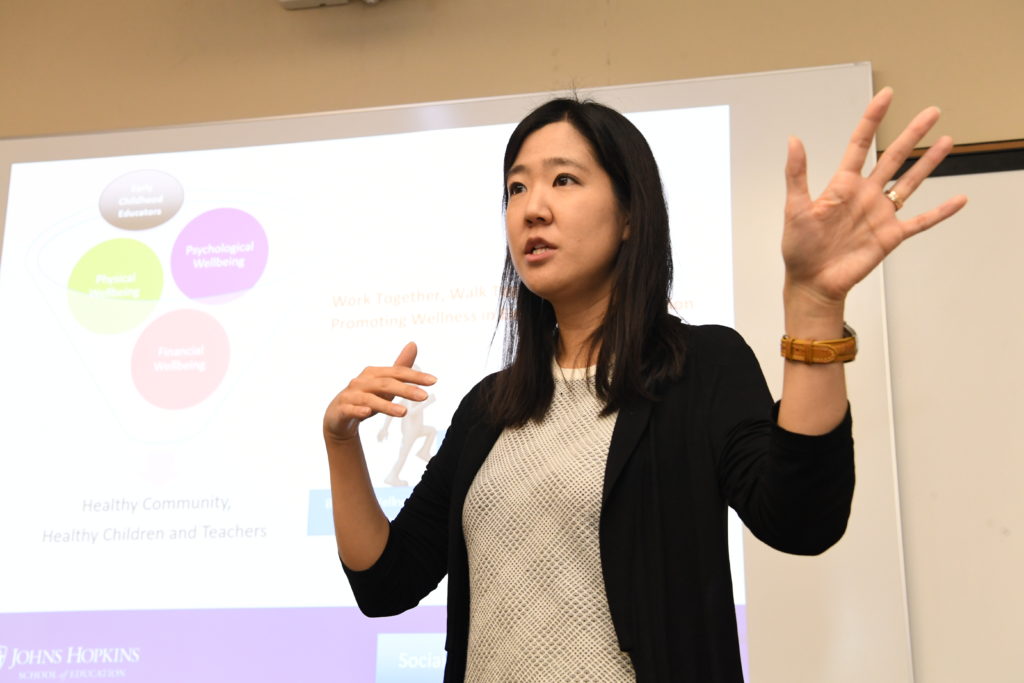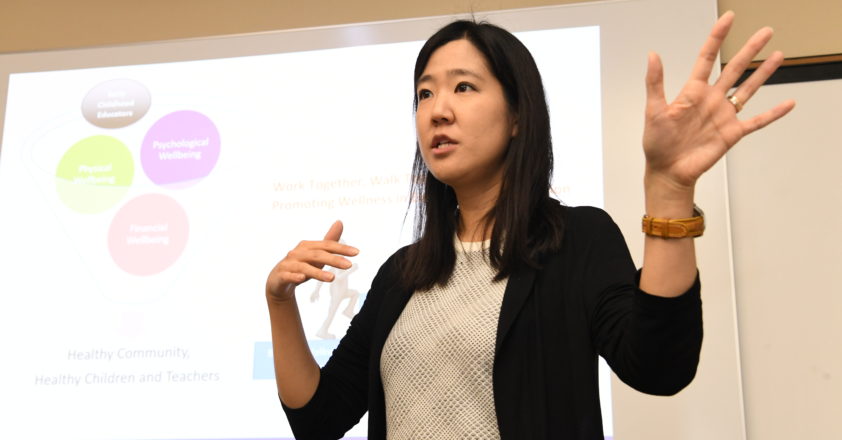Research Shows the First Five Years Are Stressful—for Preschool Teachers
Preschool is deceptively simple. Children draw and paint, learn letters and numbers, practice taking turns and sharing. But these simple routines have a profound impact on the lives of students.

Studies show that children who attend a quality preschool program are more successful—not just in the first years of primary school—but for decades beyond. They are less likely to repeat a grade and more likely to graduate from high school. They earn higher salaries as adults. They are even less likely to commit a crime.
For the past two decades, policymakers have shown a growing awareness of the power of preschool. The federal Head Start program has expanded. More jurisdictions have implemented universal prekindergarten. But despite the burgeoning respect for the importance of early childhood education, preschool teachers are struggling. They earn less than $30,000 a year on average—lower than the average salary for veterinary technicians or administrative assistants.
Yet we rely on preschool teachers to introduce children to fundamental concepts, shapes and symbols. They serve not only as educators but as social workers and referees, coaches and nurses, guiding their students through the challenges of sharing and taking turns, putting on coats, practicing good hygiene and controlling their emotions—in short, the hard work of being human.
How do preschool teachers juggle the immense physical, emotional and mental demands of their job with the realities of a low salary and little respect? For nearly a decade, Johns Hopkins University School of Education assistant professor Lieny Jeon has been exploring this question in her research.
Jeon, who earned both a master’s and doctorate from Ohio State University’s Department of Human Development and Family Science, encountered many early childhood educators who described themselves as chronically stressed. She also found that Head Start teachers—who are among the most highly educated and well-paid preschool educators—report being depressed at nearly twice the rate of the general public. One out of five Head Start teachers surveyed in a 2015 study described depressive symptoms, Jeon said.
“Early childhood teachers love working with children. It’s their passion. So, their job satisfaction level is not low, but their stress level is high,” said Jeon, who is also the director of research for the Johns Hopkins IDEALS Institute.
Low salaries can be a major stressor, Jeon found. So can a lack of access to health care. Family child care providers and employees at small, private child care centers often lack health insurance. And when teachers get sick, they often have to keep working since it’s hard to find substitutes.
“They don’t have appropriate benefits to take care of their health and well-being,” Jeon said.
The atmosphere of a school or daycare center can also have a big impact on a teacher’s sense of well-being, Jeon found. Teachers who work in noisy, chaotic environments reported higher levels of stress and depressed feelings.
The emotional climate has a significant effect on teachers as well. Teachers who did not feel supported by administrators and co-workers were also more likely to feel stressed or depressed, Jeon said.
Moreover, early childhood educators must contend with a lack of respect from others outside the profession—relatives, friends, and even the parents of students, Jeon found.
“So many of them told me, ‘We’re not babysitters,’” she recalled.
Some teachers grew emotional describing parents picking up their children’s projects— the culmination of hours of teacher preparation and patient coaching of students—and putting them directly in the trash, Jeon said.
Perhaps parents would be more kind toward preschool teachers if they realized the profound relationship between a teacher’s emotional state and that of her class. In a recent study completed for the Johns Hopkins Science of Learning Institute, Jeon found that teachers who reported feeling emotionally exhausted were more likely to rate their students as displaying angry, aggressive or anxious behavior.
It’s unclear whether there is a causal relationship between the teacher’s emotional state and the children’s behavior, Jeon said. It could be that the children’s needs cause the teacher to be stressed, that the teacher’s mood triggers the children’s behavior, or a combination of both. She hopes to conduct future research to see if there is a correlation between a preschool teacher’s level of stress or depression and a student’s readiness for kindergarten.
What is clear is that preschool teachers must perform a wide variety of tasks that require patience, creativity and empathy. When teachers are stressed or depressed, it can be harder for them to adjust to the day’s challenges.
“They might not have enough energy to engage children in many different types of activities,” Jeon said. “Depressed and stressed individuals also tend to be less sensitive to others’ psychological needs because they’re dealing with their own struggles. That can make it harder for them to meet children’s emotional needs.”
In a related study, Jeon and her colleagues showed a direct correlation between perceived working conditions and increased likelihood of teachers quitting—or leaving the profession altogether.
“If teachers aren’t doing well in the classroom, that negatively impacts children’s development,” she said. “We need to provide better support and resources for teachers.”
 The good news is that there are some relatively simple fixes to the problems early childhood educators face, Jeon said. But the bad news is they will cost money. First and foremost, preschool teachers should earn salaries and benefits commensurate with other teachers, she said. This will likely lower their stress level significantly—and attract more talented teachers to early childhood education. The challenge, though, is to figure out how to better compensate teachers without putting financial stress on families.
The good news is that there are some relatively simple fixes to the problems early childhood educators face, Jeon said. But the bad news is they will cost money. First and foremost, preschool teachers should earn salaries and benefits commensurate with other teachers, she said. This will likely lower their stress level significantly—and attract more talented teachers to early childhood education. The challenge, though, is to figure out how to better compensate teachers without putting financial stress on families.
In addition, child care center directors and preschool principals should receive training in creating an environment to maximize teacher success, Jeon said. By shifting the layout of classrooms and creating a nurturing professional climate, they can improve teachers’ sense of well-being.
One of the easiest ways to boost teachers’ moods is to provide them with tools to manage their stress level throughout the day. Jeon and Christina Harnett, a licensed psychologist and professor in the Counseling and Human Services Program of the School of Education, created an online course to help teachers recognize and manage their emotions.
Ultimately, Jeon said, the key to supporting preschool teachers is to recognize immensity and importance of their work.
“Early childhood teachers have one of the most important jobs imaginable, but we don’t treat them accordingly,” she said.




